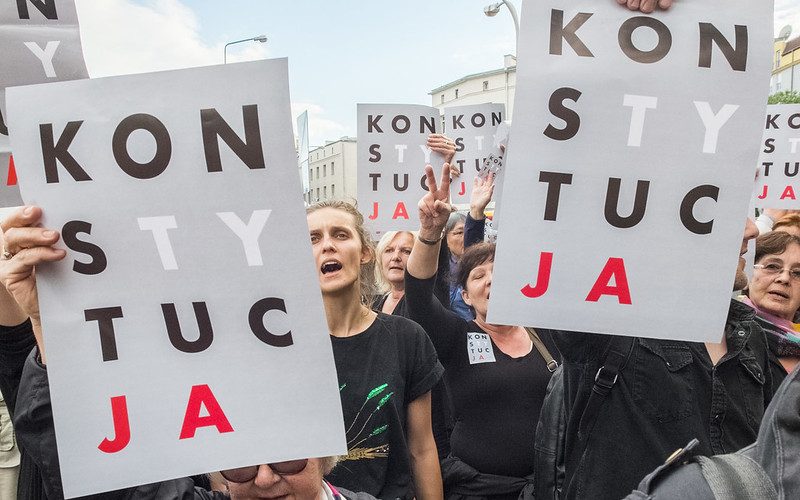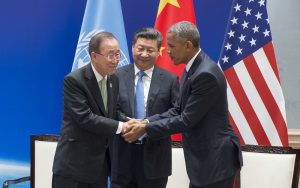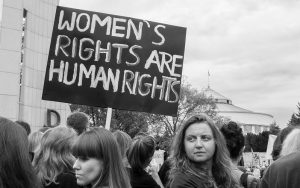On October 19, 2021, EU representatives gathered in Brussels to discuss Poland’s Constitutional Court’s recent ruling that parts of EU law are incompatible with the Polish constitution (Tilles, 2021). In a conflictive manner, Polish prime minister Mateusz Morawiecki confronted other leaders and used the concept of protecting the sovereignty in order to attack the EU, offend its principles and jeopardise Poland’s position in the Union. Having endangered relationships with the West, the Polish government continued to shift its focus to the East and decided to build a wall on the Belarusian border amidst the migrant crisis (Durman, 2021), which contested EU’s refugee policies and thus was met with an outcry from Human Rights organisations. In a similar cloud of controversy, the Polish government is also approaching domestic politics. The ruling PiS party has recently announced the reconstruction of the current government, which is suspected to be an attempt to reorganise current power structures and weaken certain members of the parliament as a result of personal vendettas (Burzyńska and Stankiewicz, 2021). Private feuds are also present in the Central Anticorruption Office, which focuses on the persecution of the head of the Supreme Chamber of Control (NIK) rather than solving thousands of corruption cases of the current government (Wilczek, 2019) and in the communication strategies of the ruling party and the opposition, which continue to fire cheap and derogatory offences at each other, rather than pursuing the creation of a sustainable economic and social agenda. It is somewhat concerning that Poland focuses less on the improvement of wellbeing and more on creating conflict. The contemporary political narrative is loud, filled with politicians fighting over wealth and power. This leaves little space for issues that are relevant to Polish citizens, such as economic security, freedom of speech and social stability. So what is really going on in Poland, an entity defined not by a group of megalomaniac politicians, but by the inhabitants, which make it all work?
On the same day as the conference in Brussels, konkret24 published a report which states that over 410 000 polish children live under the poverty line and just in 2020, over 3 million did not have access to basic needs and were thus at the risk of being socially excluded (Jaźwiński, 2021). Additionally, extreme poverty increased from 4,2 %, in 2019, to 5,2 % in 2020, predominantly as a result of the pandemic, worldwide lockdowns and the process of freezing the economy (Supernak, 2021). Although many critics, in an attempt to calm down society, claim this issue to be not only temporary but also widespread, thus common, doubts arise whether it will be easily solvable, especially when looking at the way the government seems to be putting more effort in deepening the economic crisis than reversing it. Many of the affected individuals consist of low or non-educated households, families on social welfare, farmers and children, all of which are extremely dependent on social funding, which is currently at risk.
Economic and, worse, labour stability also touches members of the academic and medical professions. 2021 brought a revival of the teachers’ strikes from 2019. However, this time, apart from protesting educational reforms and low wages, they also disagreed with the government’s ungenuine attempt to increase pay through increasing teaching load and therefore decreasing the need for teaching staff, causing a potentially massive wave of unemployment (Puculek, 2021). Alongside them are medics, who continuously lead discussions with members of the government for improved working conditions, including better working hours, increased wages, which would eliminate the need for medical staff to work multiple shifts, thus improving medical performance, additional staffing and holiday time (Ojczyk, 2021).
Stagnant wages and social support payments are no longer adequate to upkeep the standard of living of Polish citizens, especially considering that Poland’s inflation is one of the highest ones in Europe (5.6 %), followed only by Estonia and Lithuania (Eurostat, 2021). This indicates that the purchasing power of Poles decrease, while the prices of basic needs such as food, petrol, gas and electricity (the last one being largely a result of Poland’s inability to reform the energy sector, which is still based chiefly on coal) are rapidly increasing and this has a huge effect on the ability of many households, small companies or self-employed individuals to be able to maintain their quality of life and forbids them to even think about growth (Bartman, 2021).
Polish economic turmoil, however, does not end there. The Polish government creates unequal access to public resources such as money (subsidies), jobs and opportunities. It hands them to entities who follow their agenda resulting in a lot of investment being made in expired energy systems, such as coal, unexplained real estate renovations or equipment purchases for businesses associated in some ways with the ruling party (Bogdanowicz and Buras, 2021). This is especially dangerous considering that the potential recovery fund, given by the European Union, might be directed to a lesser extent to actually help the citizens. Instances where funds are claimed by companies or regions which are affiliated with the ruling party have been extensive.
A recent example is the usage of Justice Funds to sponsor equipment for Rzeszow’s fire brigade by a candidate for president for this city, who is supported by a member of the right-wing coalition Zbigniew Ziobro, the head of Justice Funds (Klauziński, 2021). This, however, is not an isolated case and scandals related to the questionable movement of funds and money make habitual occurrences. It must be added that Poland refused to publish reports about public spending connected with the Recovery Fund given by the European Union.
The government seems indifferent to the pressing struggles of the society and pursues its politics of conflict, which leads to an increasing amount of political and economic issues, with the latter being very dangerous for the financial stability of the country. Given the half a million euro fines that Poland must pay for ‘failure to respect an order from May 21, to stop extractions at Turow open-pit mine’ (Feore, 2021) and the one million euros daily that Poland must pay over its reluctance to implement the immediate suspension of its controversial judiciary reforms, a ruling made by the European Court of Justice back in July 2021 (polsatnews.pl, 2021), Poles are more and more terrified of their future, questioning the probability that they will live in a stable and secure country.
Sources Bartman, A., 2021. Podwyżki cen prądu i gazu. Kogo dotkną najmocniej? Sprawdzamy. [online] Bankier.pl. Available at: <https://www.bankier.pl/wiadomosc/Podwyzki-cen-pradu-i-gazu-Kogo-dotkna-najdotkliwiej Sprawdzamy-8194871.html> [Accessed 30 October 2021]. Burzyńska, A. and Stankiewicz, A., 2021. #111 – Kaczyński szantażowany przez „zbielaninę“. Tusk uwierzył w przyspieszone wybory. A Banaś przygotowuje się na aresztowanie. [podcast] Stan po Burzy. Available at: <https://podcastyonet.net.libsyn.com/show/stanpoburzy/111-kaczyski-szantaowany-przez-zbielanin-tusk-uwierzyw-przyspieszone-wybory-a-bana-przygotowuje-si-na-aresztowanie> [Accessed 30 October 2021]. Bogdanowicz, P. and Buras, P., 2021. „Wielka korupcja” za unijne pieniądze? Jak ograniczyć ryzyko dla Polski i UE. [online] oko.press. Available at: <https://oko.press/wielka-korupcja-za-unijne-pieniadze-jak-ograniczycryzyko-dla-polski-i-ue/> [Accessed 30 October 2021]. Durman, N., 2021. Mur na granicy z Białorusią. Wicesz MON zdradza szczegóły. [online] wiadomosci.wp.pl. Available at: <https://wiadomosci.wp.pl/mur-na-granicy-z-bialorusia-wicesz-mon-zdradza-szczegoly- 6695140558215297v> [Accessed 30 October 2021]. Eurostat, 2021. Annual inflation up to 3.4% in the euro area Up to 3.6% in the EU. [online] Ec.europa.eu. Available at: <https://ec.europa.eu/eurostat/documents/2995521/11563327/2-20102021-AP-EN.pdf/ e4d74a06-e0e6-b9eb-ed56-094eccd4109c> [Accessed 30 October 2021]. Feore, C., 2021. Poland ordered to pay the European Commission half a million euro daily penalty over Turów mine. [online] eureporter. Available at: <https://www.eureporter.co/politics/european-commission/ 2021/09/20/poland-ordered-to-pay-the-european-commission-half-a-million-euro-penalty-over-turow-lignite-mine/> [Accessed 30 October 2021]. Jaźwiński, P., 2021. Posłanka Nowacka: “dzieci żyjących poniżej granicy ubóstwa przybywa”. Dane potwierdzają. [online] Konkret24. Available at: <https://konkret24.tvn24.pl/polska,108/poslanka-nowacka-dziecizyjacych-ponizej-granicy-ubostwa-przybywa-dane-potwierdzaja,1081404.html> [Accessed 30 October 2021]. Klauziński, S. and Klauziński, S., 2021. Marcin Warchoł przekazał strażakom spod Rzeszowa sprzęt za 150 tys. z Funduszu Sprawiedliwości. [online] oko.press. Available at: <https://oko.press/marcin-warchol-rzeszowfundusz-sprawiedliwosci/> [Accessed 30 October 2021]. Ojczyk, J., 2021. Protest medyków przedstawił swoje porozumienie. Chcą podwyżek, ale stopniowo. [online] Prawo.pl. Available at: <https://www.prawo.pl/zdrowie/postulaty-protestu-medykow-wyzsze-place-i-lepsze-warunkipracy,510525.html> [Accessed 30 October 2021]. polsatnews.pl, 2021. TSUE: kolejna kara finansowa dla Polski. Milion euro dziennie https:// www.polsatnews.pl/wiadomosc/2021-10-27/milion-euro-dziennie-kara-dla-polski-chodzi-o-izbe-dyscyplinarna/. [online] polsatnews.pl. Available at: <https://www.polsatnews.pl/wiadomosc/2021-10-27/ milion-euro-dziennie-kara-dla-polski-chodzi-o-izbe-dyscyplinarna/> [Accessed 30 October 2021]. Puculek, A., 2021. Po propozycjach Przemysława Czarnka w szkołach zawrzało. Będzie strajk? “Został kac po poprzednim”. [online] wiadomosci.radiozet.pl. Available at: <https://wiadomosci.radiozet.pl/Polska/Strajk-nauczycieli- 2021-W-szkolach-bedzie-goraco> [Accessed 30 October 2021]. Supernak, B., 2021. Ubóstwo skrajne w Polsce wzrosło o 1 pkt proc. do 5,2% w 2020 – Inwestycje.pl. [online] Inwestycje.pl. Available at: <https://inwestycje.pl/gospodarka/ubostwo-skrajne-w-polsce-wzroslo-o-1- pkt-proc-do-52-w-2020/)> [Accessed 30 October 2021]. Tilles, D., 2021. Morawiecki and von der Leyen clash in debate on “rule of law crisis in Poland”. [online] Notes From Poland. Available at: <https://notesfrompoland.com/2021/10/19/morawiecki-and-von-der-leyen-clashin-debate-on-rule-of-law-crisis-in-poland/> [Accessed 30 October 2021]. Wilczek, J., 2019. Afera Banasia to już jedna z większych afer III RP – wyjaśniamy więc o co w tym chodzi od samego początku. [online] Bezprawnik. Available at: <https://bezprawnik.pl/afera-banasia/> [Accessed 30 October 2021].








Be First to Comment